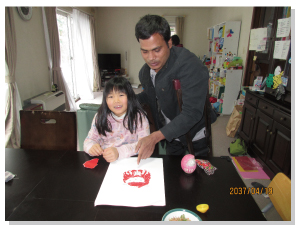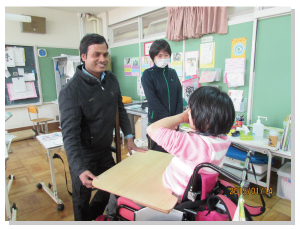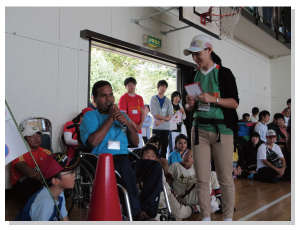- HOME
- Alumni News
- Md. Habibur Rahman MOLLAH (16th trainee)
- Mizan's Final Report
Mizan's Final Report
A Journey to Success
1. Self Introduction
My name is Habibur Rahman Mollah. I am from Bangladesh. I have polio, a condition I have had since childhood. I am now 30 years old. I work as a volunteer for an organization in Bangladesh for people with disabilities. There are 11 members of my family, we all live together. I am the only one with a disability.
Japan was the first foreign country for me. I got married a year before coming to Japan, so I missed my wife while in Japan, but there were many fun things in Japan. Japanese food and culture were interesting, and I had opportunities to visit many places. I was also very happy to go on the metro and shinkansen (the Japanese bullet train) for the first time in my life. Sometimes I thought about Bangladesh and felt homesick, but Japan and Japanese people were both wonderful and fun.
2. Japanese Language / Home-Stay / Ski Training
Before coming to Japan I had no knowledge of Japanese. Even though I studied Japanese for three months after arriving in Japan, the language was still so difficult and made me worried from time to time. I did not know how to study, and I could not write hiragana and katakana. But my teachers were very kind and gradually my Japanese improved. While studying Japanese, we also had swimming training in a pool. I had never swum before so it was very enjoyable.
I also stayed at the home of a Japanese family for 10 days in Nagano, where I learned about Japan’s culture, food, religion and law. Before going to Nagano I was worried if I could successfully complete the home-stay program because I was worried about the differences in culture and food, and also because I did not know anything about the host family. But they were very kind, and the food was lovely. On our days off, all of us went fishing together and visited Shinto shrines, all of which was very enjoyable.
In Bangladesh it never snows so I had only seen snow on television. I saw real snow for the first time in Japan. I was worried about our ski training because I did not know how I could ever ski. At first it set my pulses racing, but the ski teachers were very kind. I used bi-skis. On the last day of the training I managed to control the bi-skis by myself. This was a new experience for me.

3. Group Training and Individual Training
During the group training, I had a lot to study to become a leader for people with disabilities. Our study objectives included abuses and discriminations towards people with disabilities, law and movements concerning people with disabilities, and various disabilities including those of people of Asia with disabilities, and people with hearing / visual / physical impairments. I also learned about proposal writing. I consider the group training very important as a source of new knowledge. There were also opportunities for us trainees to get together and talk about our feelings and future dreams.
During the individual training, I learned about issues surrounding people with disabilities, about barrier-free society, lives of people with disabilities, disability movement in Japan, welfare for people with disabilities, and national services for people with disabilities.
At the center for independent living, I learned about how people with disabilities live independently. Individual training was very important for me because it is relevant to the many problems people with disabilities in Bangladesh face. Now I understand how Japanese people with disabilities live, and how people with disabilities can live an independent life.
At DPI-Japan, I learned about international seminars and laws for people with disabilities. As I learned about the international networks, I wanted to build an international network myself in the future.
I stayed at Center for Independent Living Hoshizora for approximately one month. In their small office, people with and without disabilities were working together. Something I thought was a very important part of the movement. I also learned about rehabilitation for people with disabilities. At Center for Independent Living Movement in Osaka, I went out into town with 40 wheelchair users, to check if supermarkets and railway stations were barrier-free. I also experienced fund raising. At AJU Center for Independent Living, I learned about employment of people with disabilities, as well as how to repair wheelchairs, and about the history of disability movement. AJU offers support to people with disabilities across Asia, and they taught me how it was done. The most memorable event during the training at AJU was a match-making party for people with disabilities. It was wonderful. I think the participants felt both happy and sad; happy if they found their date, and sad otherwise. In my home country, there are many people with disabilities with no chances of dating or marriage. I hope I can organize a match-making event like this in Bangladesh.
At Hakku no Ie (House of Hack) in Tanohata Village, I learned about mainstreaming people with disabilities. Forty years ago, Tanohata Village had a population of 8,000, but now it is down to 3,500. Declining population is a huge problem for a community, but at Hakku no Ie, everyone was working together—people with and without disabilities, old men and women, and people with difficult diseases. I thought it was a wonderful community.

Summary
Duskin’s leadership training program gives Asia’s people with disabilities a chance to become a big family. I am so proud of becomoinga member of the Duskin family. People with disabilities from across Asia are involved in various activities, after participating in this leadership training program. And gradually, Asia is changing, and becoming a place that is more accommodating for people with disabilities.
Though small, Bangladesh is a very energetic country. About 10% of the population has some kind of disabilities. People in Bangladesh are kind to people with disabilities, but there are still many issues, the biggest being the country not being barrier-free. Our law is not adequate for supporting people with disabilities, and there are few jobs for people with disabilities. Welfare is also not very good. I would like to work for a NPO for people with disabilities and solve these issues. I am committed to work with ex Duskin trainees in Bangladesh, to work for people with disabilities. My long journey has only just begun.
I would like to express my utmost gratitude, to everyone from the Duskin AINOWA Foundation, Japanese Society for Rehabilitation of Persons with Disabilities (JSRPD), and everyone else who took me on board. Thank you so much.





